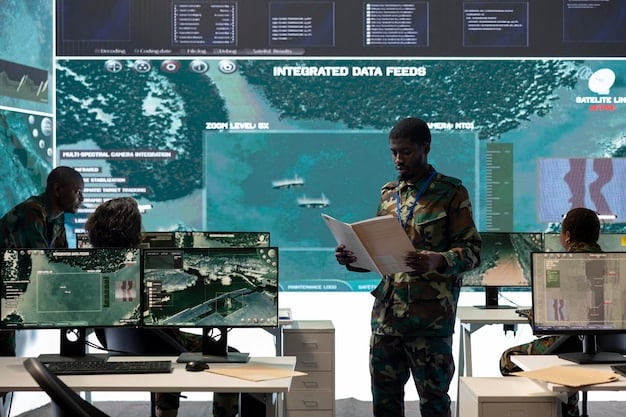AI in US Military Strategy: Implications of Recent Developments

The latest advancements in Artificial Intelligence (AI) offer transformative potential for the US military, impacting strategy across areas like autonomous systems, cyber warfare, intelligence analysis, and decision-making processes, while also raising complex ethical and security concerns.
The rapid evolution of artificial intelligence is reshaping numerous aspects of modern life, and its influence on military strategy is particularly profound. Understanding what are the implications of the latest developments in Artificial Intelligence for US Military Strategy is crucial for policymakers, military leaders, and anyone concerned about national security.
The Expanding Role of AI in Modern Warfare
Artificial Intelligence (AI) is no longer a futuristic concept but a rapidly evolving reality with significant implications for modern warfare. Its integration into various aspects of military operations is transforming how wars are fought and national security is maintained.
From enhancing decision-making processes to automating tasks, AI is revolutionizing military capabilities. However, this technological leap also presents challenges that need to be addressed proactively.
AI in Autonomous Systems
Autonomous systems, driven by AI, are becoming increasingly prevalent in military applications. These systems can operate independently, reducing the need for human intervention in dangerous or repetitive tasks.
Examples include unmanned aerial vehicles (UAVs), autonomous submarines, and robotic ground vehicles equipped with AI for navigation, target recognition, and threat assessment.
- AI-powered drones can conduct reconnaissance missions and provide real-time intelligence.
- Autonomous submarines can patrol vast ocean areas, detecting and neutralizing threats.
- Robotic ground vehicles can assist in logistics, security, and explosive ordnance disposal.
AI in Cyber Warfare
Cyber warfare is another area where AI is making a substantial impact. AI algorithms can be used to detect and respond to cyber threats more quickly and effectively than traditional methods.
AI can analyze network traffic patterns, identify anomalies, and predict potential cyber-attacks, enabling proactive defense measures. It can also automate the process of vulnerability assessment and patching, reducing the risk of successful breaches.

The increasing reliance on AI in cyber warfare raises complex ethical and legal questions, particularly regarding the use of autonomous weapons systems in cyberspace.
In conclusion, AI is poised to revolutionize military strategy by enhancing autonomous systems and transforming cyber warfare, but also presents challenges that must be addressed.
Enhancing Intelligence Analysis and Decision-Making
AI is revolutionizing intelligence analysis and decision-making within the US military. Its ability to process vast amounts of data and identify patterns far exceeds human capabilities, providing invaluable insights for strategic planning and operational execution.
From predictive analytics to real-time threat assessment, AI is enhancing the speed and accuracy of military decision-making, potentially improving the outcomes of military operations.
Predictive Analytics in Military Strategy
Predictive analytics, powered by AI, enables military planners to anticipate future events and trends based on historical data and current intelligence. This capability allows for more proactive and adaptive strategies.
AI algorithms can analyze data from various sources, including satellite imagery, social media feeds, and sensor data, to identify potential threats, predict enemy movements, and assess the impact of different courses of action.
- Predicting potential conflict zones based on geopolitical indicators.
- Anticipating enemy tactics and strategies based on historical patterns.
- Assessing the effectiveness of different military interventions.
Real-Time Threat Assessment
AI is being used to provide real-time threat assessments, enabling military commanders to make informed decisions in fast-moving and complex environments. AI systems can analyze sensor data from multiple sources, identify potential threats, and provide alerts to military personnel.
This capability is particularly valuable in situations where speed and accuracy are critical, such as air defense and missile interception.

AI-enabled threat assessment could reduce the risk of surprise attacks and improve the overall effectiveness of military operations.
In essence, AI is enhancing intelligence analysis and decision-making by providing predictive analytics and real-time threat assessments, leading to more effective military strategies and outcomes.
Ethical and Legal Considerations
The integration of AI into military strategy raises complex ethical and legal considerations that must be addressed to ensure responsible and accountable use of this technology. Issues such as autonomous weapons, bias in algorithms, and transparency in decision-making require careful examination.
Addressing these challenges is crucial for maintaining public trust and ensuring that AI is used in accordance with international laws and ethical principles.
Autonomous Weapons Systems
Autonomous weapons systems, also known as “killer robots,” are AI-powered systems that can select and engage targets without human intervention. The development and deployment of such weapons raise profound ethical and legal questions.
Critics argue that autonomous weapons could violate fundamental principles of international humanitarian law, such as the distinction between combatants and non-combatants, and the principle of proportionality.
- The potential for unintended consequences and accidental harm is a major concern.
- It may be difficult to assign legal responsibility for the actions of autonomous weapons.
- There is a risk that autonomous weapons could escalate conflicts and lower the threshold for war.
Bias in Algorithms
AI algorithms are trained on data, and if that data reflects existing biases, the algorithms may perpetuate or amplify those biases. This can have serious consequences in military applications, such as target selection and risk assessment.
For example, if an AI system is trained on data that over-represents certain demographic groups as potential threats, it may unfairly target individuals from those groups.
Bias in algorithms could erode public trust in military operations and undermine the legitimacy of military actions.
In summary, the ethical and legal considerations surrounding AI in military strategy necessitate addressing issues like autonomous weapons and algorithmic bias to ensure responsible use.
Security Risks and Countermeasures
The increased reliance on AI in military applications introduces new security risks that must be addressed proactively. These risks include adversarial attacks, data poisoning, and supply chain vulnerabilities.
Developing robust security measures and countermeasures is essential for protecting AI systems from malicious actors and ensuring the integrity of military operations.
Adversarial Attacks
Adversarial attacks involve manipulating AI systems by feeding them carefully crafted inputs that cause them to make incorrect decisions. These attacks can be difficult to detect and can have serious consequences in military applications.
For example, an adversary could use adversarial attacks to trick an AI-powered missile defense system into misidentifying targets, or to cause an AI-controlled drone to malfunction.
Defending against adversarial attacks requires developing robust detection and mitigation techniques.
Data Poisoning
Data poisoning involves injecting malicious data into the training datasets used to develop AI algorithms. This can corrupt the algorithms and cause them to make flawed decisions.
For example, an adversary could poison the data used to train an AI system for identifying enemy combatants, causing it to misidentify friendly forces or civilians as threats.
Protecting against data poisoning requires careful monitoring of data sources and implementation of data validation techniques.
In conclusion, combating security risks in AI military strategy involves countermeasures against adversarial attacks and data poisoning to safeguard military operations.
The Future of AI in US Military Strategy
The future of AI in US military strategy is expected to be transformative, with AI playing an increasingly central role in all aspects of military operations. Emerging technologies, such as quantum computing and neuromorphic computing, offer the potential for even more advanced AI capabilities.
However, realizing this potential will require sustained investment in research and development, as well as a commitment to responsible and ethical innovation.
Emerging Technologies
Quantum computing and neuromorphic computing are two emerging technologies that could significantly enhance AI capabilities in the future. Quantum computing could enable AI systems to solve complex problems that are currently intractable, such as optimizing logistics and simulating battlefield scenarios.
Neuromorphic computing, which mimics the structure and function of the human brain, could enable AI systems to perform tasks that require creativity and adaptability.
- Quantum computing for enhanced data processing and analysis.
- Neuromorphic computing for improved pattern recognition and learning.
- AI-driven simulations for realistic training scenarios.
Investment in Research and Development
Sustained investment in research and development is essential for maintaining US leadership in AI and ensuring that the US military has access to the most advanced AI capabilities. This includes funding for basic research, applied research, and technology development.
It also requires attracting and retaining top talent in AI and related fields.
Investing in AI research and development is critical for ensuring that the US military remains competitive in the future.
To summarize, the future of AI in US military strategy involves harnessing emerging technologies and investing in R&D to ensure continued leadership.
The Role of International Cooperation and Competition
International cooperation and competition play a significant role in shaping the development and deployment of AI in military strategy. The US faces both opportunities and challenges in navigating this complex landscape.
Collaborating with allies on AI research and development can accelerate innovation and promote interoperability. At the same time, competition with adversaries can drive the development of advanced AI capabilities.
Cooperation with Allies
Cooperating with allies on AI research and development can provide access to a wider range of expertise and resources. This can accelerate the pace of innovation and improve the quality of AI systems.
Collaboration can also promote interoperability, ensuring that AI systems from different countries can work together effectively in joint operations.
Sharing best practices and lessons learned can help avoid duplication of effort and reduce the risk of unintended consequences.
Competition with Adversaries
Competition with adversaries can drive the development of advanced AI capabilities. The US military must be prepared to counter the AI capabilities of potential adversaries, such as China and Russia.
This requires continuous investment in research and development, as well as a willingness to experiment with new technologies and approaches.
It also requires a clear understanding of the ethical and legal implications of AI in military strategy.
In essence, navigating international cooperation and competition is crucial for effective AI implementation in US military strategy, balancing collaboration with strategic rivalry.
| Key Point | Brief Description |
|---|---|
| 🤖 AI in Warfare | Transforming military operations through automation and enhanced capabilities. |
| 🛡️ Ethical Concerns | Addressing issues like autonomous weapons and algorithmic bias is crucial. |
| 🔒 Security Risks | Protecting AI systems from adversarial attacks and data poisoning is essential. |
| 🤝 International Role | Cooperation with allies and competition with adversaries shape AI development. |
Frequently Asked Questions (FAQ)
▼
AI is being integrated into areas such as autonomous systems, cyber warfare, intelligence analysis, and decision-making processes to enhance military capabilities and efficiency.
▼
The main ethical concerns revolve around the use of autonomous weapons systems, the potential for bias in algorithms, and the need for transparency in AI-driven decision-making.
▼
AI enhances intelligence analysis by processing vast amounts of data, identifying patterns, and providing predictive analytics to enable more informed and proactive decision-making.
▼
Security risks include adversarial attacks, where AI systems are manipulated to make incorrect decisions, and data poisoning, where malicious data corrupts the training process.
▼
International cooperation allows access to wider expertise, accelerates innovation, ensures interoperability, but requires balancing collaboration with strategic competition with adversaries.
Conclusion
In conclusion, the integration of AI into US military strategy presents both unprecedented opportunities and complex challenges. By understanding and addressing these implications, the US can harness the full potential of AI while mitigating the risks and ensuring responsible use.





